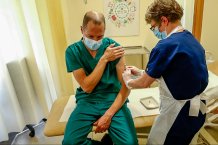Articles

The ExeCTU collaborates with healthcare researchers to design and deliver important health-related studies.
Exeter Clinical Trials Unit: instrumental in important and wide-ranging COVID-19 research
The University of Exeter Clinical Trials Unit (ExeCTU) has been instrumental in facilitating three major trials into COVID-19 in the past year.
On this year’s International Clinical Trials Day, we are marking the outstanding contribution the ExeCTU has made in advancing crucial research that builds understanding of improving treatment and care in the face of the pandemic.
The ExeCTU collaborates with healthcare researchers, locally, nationally and internationally, to design and deliver important health-related studies, ensuring clinical research is of the highest quality. Since its inception in 2015, ExeCTU has been actively involved in 30 studies.
In the last year, the UK Clinical Research-Collaboration-registered ExeCTU has played a key role in three major trials related to COVID-19.
ExeCTU director Professor Siobhan Creanor said: "It’s been an extraordinary year and I want to say an enormous thank you to all the staff in the CTU. Designing and undertaking successful clinical trials is an incredible team effort, involving collaborations in the University, the NHS and beyond. And of course healthcare research simply can’t happen without all the people who participate in clinical trials, for which we are extremely grateful. Staff across ExeCTU have worked extremely hard to set up and deliver new trials of interventions designed to reduce the burden and impact of COVID-19, whilst rapidly adapting to the challenges of remote working during the pandemic. We’ve also continued work on the other trials in our growing portfolio whilst seeking new opportunities to ensure ExeCTU continues to make a significant contribution to research answering important healthcare questions.”
BRACE trial – does the BCG vaccine protect against COVID-19?
ExeCTU played a lead role in setting up the UK arm of the international BCG vaccination to reduce the impact of COVID-19 in healthcare workers’ (BRACE) Trial. Led by Professor John Campbell, this trial recruited health and care home staff workers, to investigate whether the BCG vaccine might help protect them against COVID-19.
A large team from ExeCTU came together at short notice to get BRACE up and running in the UK. Within a very short space of time they adapted international documents to be UK-specific, obtained relevant approvals, initiated sites and managed all the recruitment.
Professor John Campbell said: “The ExeCTU was absolutely critical in getting this trial established. It was incredible to see a team with such a strong and diverse skillset assemble at short notice, working flexibly and efficiently to get our recruitment sites set up in a matter of weeks. It really was quite a feat, and we’ve contributed to nearly 7,000 patients recruited across the trial who are now being followed up.”
The BRACE trial is coordinated by the Murdoch Children’s Research Institute (MCRI) in Melbourne, Australia.
COVID-NURSE – studying nursing in a pandemic
A national team of scientists and nurses, led from the University of Exeter, is researching nursing care for patients in hospital with COVID-19. Funded by the National Institute for Health Research (NIHR) and UK Research and Innovation (UKRI), the team is evaluating a system of nursing care designed specifically for COVID patients in a large clinical trial across the UK.
ExeCTU rapidly set up the randomised controlled trial, which is comparing “care as usual” with care under a nursing care protocol created within the trial.
Professor David Richards, who leads the study, said: “The team at ExeCTU fast-tracked the set-up of this trial, and staff have been incredible at positively engaging NHS sites, which are working themselves in a challenging and changing environment. To date 11 UK sites are contributing to the study, and the ExeCTU has worked flexibly and dynamically to keep pace with the rapidly evolving landscape.”
COVID eWHELD – supporting care homes during the pandemic
Many of the 400,000 people living in care homes in the UK have dementia, mental health or neuropsychiatric symptoms, and a number of physical illnesses. They are at particularly high risk of developing severe COVID-19, and providing support is challenging for care staff who are facing a difficult, distressing and isolated work environment. Now, researchers are trialling an innovative online programme to improve and personalise care for people with dementia in care homes, which were hard-hit by the COVID-19 crisis.
Funded by the National Institute for Health Research (NIHR) and UK Research and Innovation (UKRI), the new programme is led by the University of Exeter and King’s College London, involving the universities of East Anglia and Hull, and the London School of Economics, the research is also funded by Torbay Council and the Schroder Foundation, and supported by Alzheimer’s Society. The study will draw on the most successful elements of the Improving Wellbeing and Health for People with Dementia (WHELD) programme, one of the very few staff training programmes that is proven to improve lives for people with dementia in care homes. Previous clinical trials have demonstrated that WHELD improved quality of life and mental health, and reduced the use of harmful sedative drugs. The staff training programme has been adapted to the needs presented by the COVID-19 crisis, and a digital version of the adapted programme is now being provided to care homes nationwide, with support provided virtually, in a large cluster randomised controlled trial.
Professor Clive Ballard, Dean and Pro Vice-Chancellor of the University of Exeter Medical School, said: “The incredible staff at ExeCTU have proved extremely agile in customising and adapting software to significantly speed up the research process. We’re now in full swing of recruiting care homes to make a real difference to care, and we wouldn’t be in this position without the ExeCTU team.”
Date: 19 May 2021
